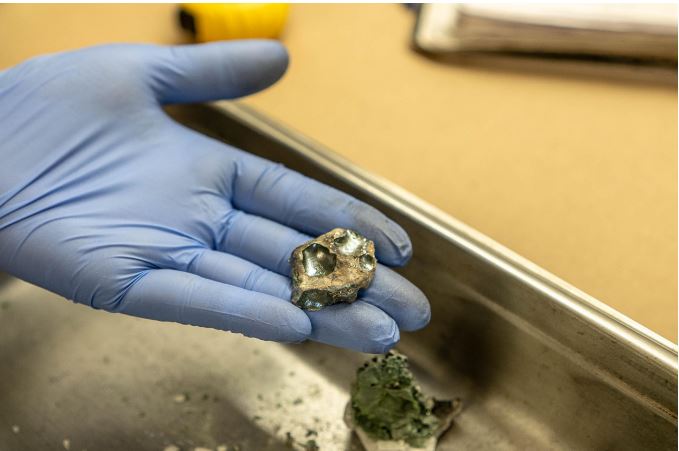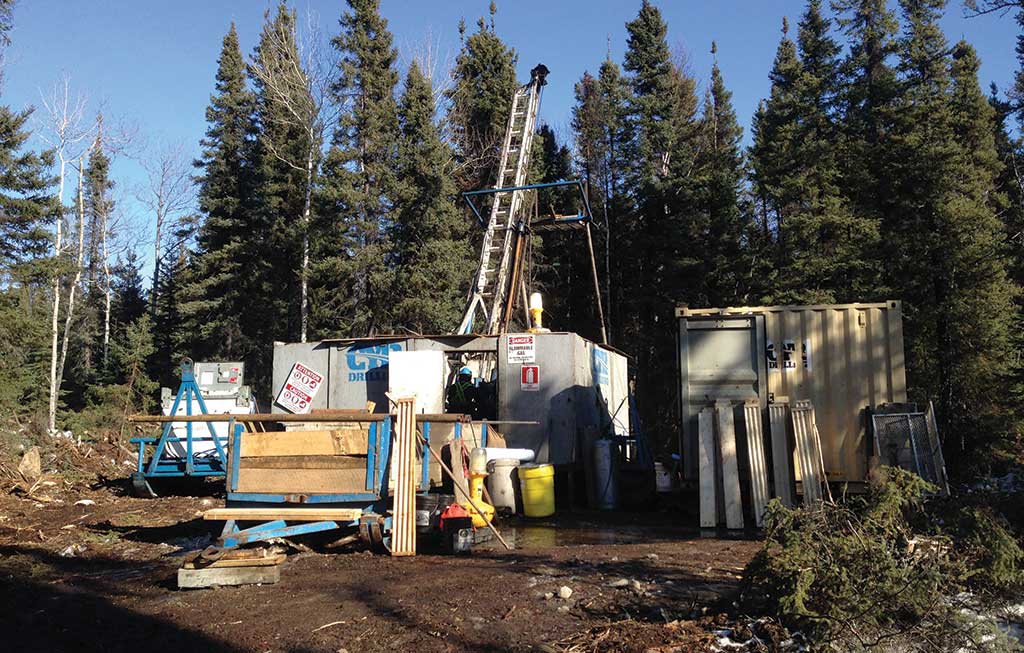VANCOUVER –
DeepGreen Metals intends to be the world’s first zero tailings miner by retrieving polymetallic base metal nodules from the seafloor. In lab tests the nuggets have been treated with calcination and smelting techniques that produced iron-rich alloy nuggets with payable amounts of nickel, copper and cobalt.
[caption id="attachment_1003731277" align="alignleft" width="243"]
 Base metal nuggets collected at the Clarion Clipperton zone in the Pacific Ocean. (Image: DeepGreen Metals)
Base metal nuggets collected at the Clarion Clipperton zone in the Pacific Ocean. (Image: DeepGreen Metals)[/caption]
A manganese silicate product was also produced.
DeepGreen and its subsidiary NORI (Nauru Ocean Resources Inc.) are interested in the Clarion Clipperton (CC) zone in the eastern Pacific Ocean. NORI holds a 15-year exploration contract for the 74,830 km
2 project area.
The company is doing further tests and engineering studies with plans of building a pilot plant next year. It will produce nickel and cobalt sulphates and copper cathode products. Suitable sites for a commercial plant are under consideration.
The nodules are typically 1 to 20 cm in diameter, 4,000 to 5,000 metres below the surface. The nodules occur as concentric layers of manganese and iron oxides and hydroxide concentrated around a core, according to DeepGreen.
Earlier this year a preliminary economic assessment, put NORI inferred resources at 909 million tonnes (wet nodules) grading 1.3% nickel, 29.2% manganese, 1.1% copper and 0.2% cobalt with a mean nodule abundance of 13 kg/m
2 based on a cut-off of 4 kg/m
2.
DeepGreen has two videos of interest posted at its website. Watch
Mission: Zero-tailings Metallurgy and
Mission: Deep Seabed Exploration by clicking on the title of the desired video.
Editor’s note: The company boasts of being “the world’s first zero tailings mining project.” While the claim is supported because no solid tails will be produced and stored at the mine, mining the seafloor is not without risks. The nuggets occur in mud, and the act of mining will undoubtedly create extensive turbidity of the seawater during mining. And there is considerable ecological opposition to disturbing the seafloor.

 Base metal nuggets collected at the Clarion Clipperton zone in the Pacific Ocean. (Image: DeepGreen Metals)[/caption]
A manganese silicate product was also produced.
DeepGreen and its subsidiary NORI (Nauru Ocean Resources Inc.) are interested in the Clarion Clipperton (CC) zone in the eastern Pacific Ocean. NORI holds a 15-year exploration contract for the 74,830 km2 project area.
The company is doing further tests and engineering studies with plans of building a pilot plant next year. It will produce nickel and cobalt sulphates and copper cathode products. Suitable sites for a commercial plant are under consideration.
The nodules are typically 1 to 20 cm in diameter, 4,000 to 5,000 metres below the surface. The nodules occur as concentric layers of manganese and iron oxides and hydroxide concentrated around a core, according to DeepGreen.
Earlier this year a preliminary economic assessment, put NORI inferred resources at 909 million tonnes (wet nodules) grading 1.3% nickel, 29.2% manganese, 1.1% copper and 0.2% cobalt with a mean nodule abundance of 13 kg/m2 based on a cut-off of 4 kg/m2.
DeepGreen has two videos of interest posted at its website. Watch
Base metal nuggets collected at the Clarion Clipperton zone in the Pacific Ocean. (Image: DeepGreen Metals)[/caption]
A manganese silicate product was also produced.
DeepGreen and its subsidiary NORI (Nauru Ocean Resources Inc.) are interested in the Clarion Clipperton (CC) zone in the eastern Pacific Ocean. NORI holds a 15-year exploration contract for the 74,830 km2 project area.
The company is doing further tests and engineering studies with plans of building a pilot plant next year. It will produce nickel and cobalt sulphates and copper cathode products. Suitable sites for a commercial plant are under consideration.
The nodules are typically 1 to 20 cm in diameter, 4,000 to 5,000 metres below the surface. The nodules occur as concentric layers of manganese and iron oxides and hydroxide concentrated around a core, according to DeepGreen.
Earlier this year a preliminary economic assessment, put NORI inferred resources at 909 million tonnes (wet nodules) grading 1.3% nickel, 29.2% manganese, 1.1% copper and 0.2% cobalt with a mean nodule abundance of 13 kg/m2 based on a cut-off of 4 kg/m2.
DeepGreen has two videos of interest posted at its website. Watch 




Comments